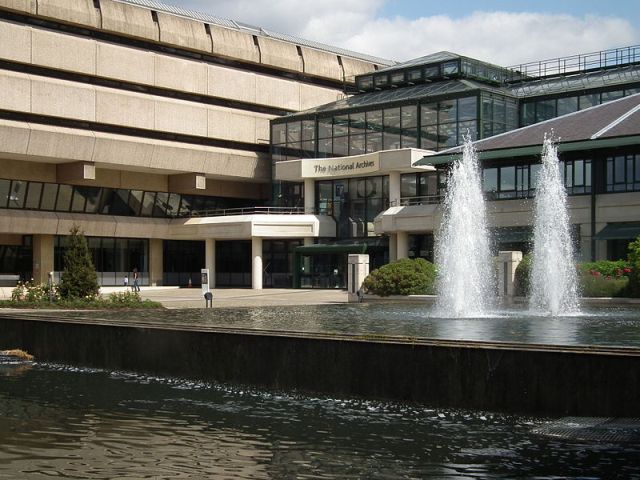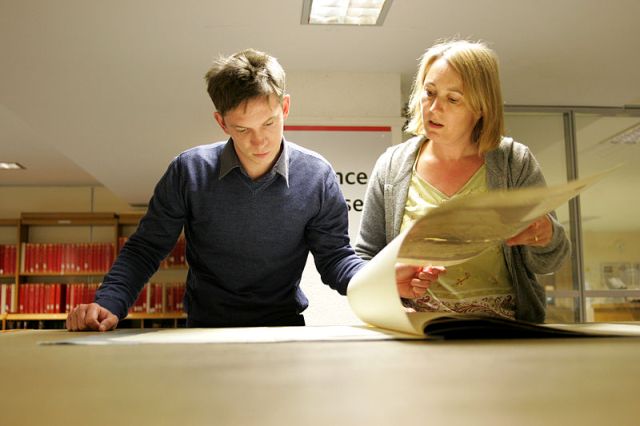
- A great place to visit, if you do some preparation first
It’s obvious from the comments, tweets and other feedback that we’ve had about our blog that its readers are a diverse group. Some of you have a lot of experience of doing research and others have none.
This post is mainly aimed at readers with little or no experience of visiting archives to use original, paper records, but who think that they would like to do so. If you’re thinking of visiting The National Archives or another archives at some stage, you might find it useful to bear in mind the following hints.
Step 1: Preliminary research
Doing some research in advance is always worthwhile. It can help you work out what records will be useful to you, save you from wasting time during your visit, or even stop you from making an unnecessary journey.

Doing some initial research online
As I mentioned in a previous blog post, the best place to start your research is usually online. Many archives now have a catalogue and other useful information on their websites, and you might even find that the records you want to see have been digitised.
Depending on your topic, you could also find it useful to look at some books or other printed sources too. If you’re going to a library to look for books, don’t forget to check whether the library subscribes to any useful electronic reference sources as well.
Another useful form of preliminary research can be to contact the archives that you intend to visit. Do take a quick look at the institution’s website before writing an email or picking up the phone, though. You might find that your question has already been answered there.
Step 2: Preparing for your visit
It’s worth checking the following points when planning your visit. They may seem obvious, but it’s surprising how many people forget them.
- Where is the archives located [ref] 1. There are several online search tools (including some on our website) that contain information about records held by various different archives. Check your search results carefully to make sure that you’re visiting the right place. [/ref] and how will you travel there?
- What are the opening days and times?
- Do you need to book in advance? (This varies from place to place.)
- Do you need to bring ID with you? (Very often, you’ll need two separate proofs of identity and address)
Most archives have all of this information on their websites but for some small archives you may need to contact staff to ask.
Although nearly all archives allow you to use a laptop or tablet computer, it’s a good idea to bring a notebook and pencil with you too. (It must be a pencil: you won’t be allowed to use a pen.) If you’ve made some notes during your preliminary research, don’t forget to bring those as well.
It’s also worth checking whether you’re allowed to bring a camera with you. Many archives will allow you to use your own camera to take photos of records, sometimes for a small fee. Others don’t allow cameras, usually because there are significant copyright or other restrictions on making copies of the records that they hold.
Step 3: When you arrive
Archives vary a great deal in size and in how they operate so it isn’t always easy to know what to expect on your first visit, but the following points apply to most archives.
Original records are nearly always kept in secure storage, not on shelves that you can browse through yourself. A member of staff will bring the records that you want to see to a reading room for you to look at them. The system for ordering records and how long it takes to fetch them are different in each archives, depending on its size and resources, and on how far away the reading room is from the storage areas.
Sometimes you will already have identified exactly what records you want to see during step 1. Other times it can be less straightforward, and you might need to spend some time looking at paper catalogues or indexes before you’re sure what records you need.

Handling the records carefully
All archives have strict rules in place to protect the security and wellbeing of the records in their care, and to provide a comfortable research environment for you and for other visitors. You won’t be allowed to take food and drink, bags, pens, erasers or sharp objects into the reading room, and you should work quietly to avoid disturbing other people.
It’s very important to handle original records carefully. You don’t normally need to wear gloves but it is often necessary to use special blocks or weights to support the records while you’re reading them.
Throughout your visit, a member of staff will never be far away. Staff can’t do your research for you, but they can give you some advice about the records, show you how to place orders or explain the reading room rules. If you’re not sure what to do, please ask!
What next?
Start your research using our research guidance and online search tools.
Find out more about visiting The National Archives.
Watch our quick animated guides on doing preliminary research, preparing for your visit and getting started when you arrive at The National Archives.
Very Interesting article. Great to see archives available for public via the internet.
William
If you are visiting several archives then they may accept the County Archives Research Network (CARN) card which allows you to view their records for two years, but The National Archives doesn’t accept CARN cards, some archives do and some dion’t.
You need to be aware that not all catalogues entries are extensive or exist at all and may use terms that are obscure or politically incorrect today.
Thank you, David. These are very useful points for new (and, indeed, more experienced) researchers to be aware of.
For researchers who need to visit several different local archives, it’s worth knowing that where an institution is a member of the CARN scheme, its entry in the Archon directory (www.nationalarchives.gov.uk/archon) should say so.
The Kentucky Dept of Archives and History is a wonderful resource, I use it a lot.
Before going to any archive pull up their website and catalogue to see what they have on the area and time frame you are researching, ie county marriage, deeds, wills, etc. If you can print microfilm numbers it saves lots of time.
Print these out and take with you as well as a map that shows the contiguous counties, people moved around a lot and you may need to check adjacent counties.
I take abbreviated census printouts for the time periods I need to find a marriage or probate record.
Dress in layers, sweater/shirt, its either cold or hot.
Always take a photo ID, and a candy or protein bar for emergencys, as I never stop till they close.
Label all your materials with your name, address and cell number, because you will leave something behind.
I might suggest hiring someone to ‘orient’ you to the archives, large library, etc.
I had been to the Philadelphia library many years ago and was overwhelmed. They did not have enough staff to be of much help, so the next year, I hired a researcher to show me how to use that vast library. I paid her regular fees, including travel time from her home to the library and back.
My two trips to the National Archives were limited in scope, so did not have the trouble on those visits… but I would consider doing the same thing if I go again.
Thank you, Julia. That’s a very helpful comment.
As an archivist, I can advise would-be researchers on how I think they should prepare for a visit but it can be just as useful for new researchers to learn from the wisdom of more experienced users of archives.
Thank you, Gloria. As with Julia’s comment, sometimes the most useful advice is what one researcher can offer to another.
It may sound a fairly obvious question but researchers should check that they are in the right archives office, eg London has many archives and Hampshire has some records which you would expect to be in another branch of their archives, Portsmouth being an example, and what happens when parishes move from county to county.
Thank you, David. I alluded to this point in my original post but it’s something that’s always worth reiterating, however obvious it may seem to more experienced researchers. You can save yourself a lot of time and money by making sure that you’re visiting the right place.
I’ve forgotten – can I order a file in advance online if I have the correct reference?
Hi Robert,
There’s information on ordering documents in advance on our website here: http://www.nationalarchives.gov.uk/about/visit-us/researching-here/ordering-documents-in-advance-or-in-bulk/
I hope that helps.
Best,
Nell
I had been able to order documents online from home for a specified day when I could be in London.
However, now (May 2017) I can no long find the old helpful page on your site where documents could be ordered online from afar in preparation for a visit.
That should be restored and shown prominently.
Thanks for your comment, Sylvester.
This page is still available and the link to it in my colleague Nell Brown’s comment above still works: http://www.nationalarchives.gov.uk/about/visit-us/researching-here/ordering-documents-in-advance-or-in-bulk/
I wish you every success with your research.
Note that the bulk/preorder link does not work. http://www.nationalarchives.gov.uk/about/visit-us/researching-here/ordering-documents-in-advance-or-in-bulk/
That is, as of 3:54 today, 7-21-2022. Is has not worked for at least the last hour, and I could not get it to work yesterday either, and the librarian on call does not know how it works either.
Hi Margaret. Apologies, that’s an old blog post so the page that is linked to is no longer available. This is the current page: https://www.nationalarchives.gov.uk/about/visit-us/researching-here/how-to-order-view-and-copy-documents/.
Best wishes,
Matthew De Ville